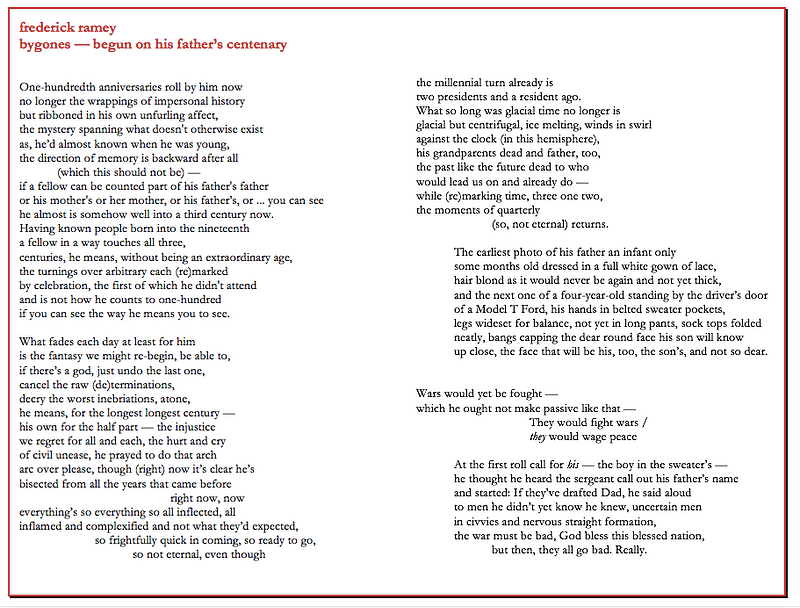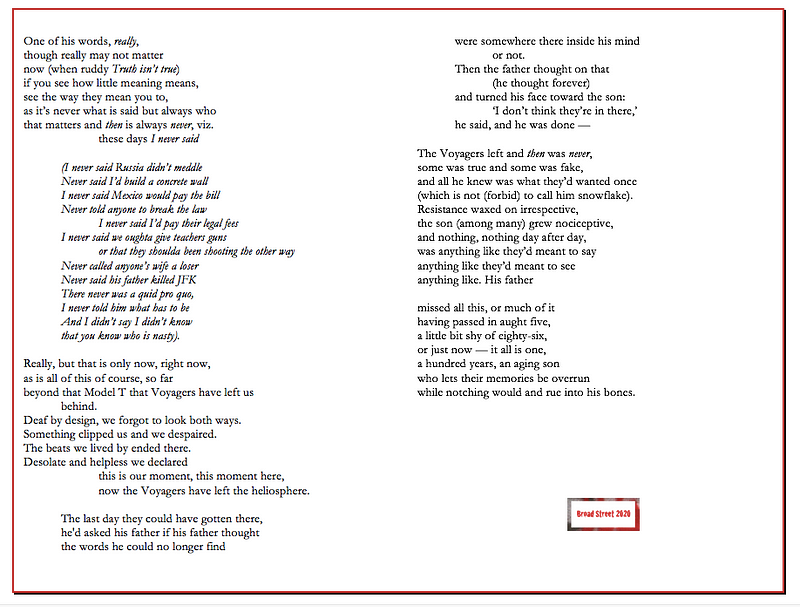“… ‘really’ may not matter
now (when ruddy Truth isn’t true)
if you see how little meaning means,
see the way they mean you to …”
—————-
To enjoy this feature as a broadside, drag the images to your desktop–or read the plain text below.
———-


bygones — begun on his father’s centenary
One-hundredth anniversaries roll by him now
no longer the wrappings of impersonal history
but ribboned in his own unfurling affect,
the mystery spanning what doesn’t otherwise exist
as, he’d almost known when he was young,
the direction of memory is backward after all
xxxxxx (which this should not be) —
if a fellow can be counted part of his father’s father
or his mother’s or her mother, or his father’s, or … you can see
he almost is somehow well into a third century now.
Having known people born into the nineteenth
a fellow in a way touches all three,
centuries, he means, without being an extraordinary age,
the turnings over arbitrary each (re)marked
by celebration, the first of which he didn’t attend
and is not how he counts to one-hundred
if you can see the way he means you to see.
—
What fades each day at least for him
is the fantasy we might re-begin, be able to,
if there’s a god, just undo the last one,
cancel the raw (de)terminations,
decry the worst inebriations, atone,
he means, for the longest longest century —
his own for the half part — the injustice
we regret for all and each, the hurt and cry
of civil unease, he prayed to do that arch
arc over please, though (right) now it’s clear he’s
bisected from all the years that came before
xxxxxxxxxxxxxxxxxx right now, now
everything’s so everything so all inflected, all
inflamed and complexified and not what they’d expected,
xxxxxx xxxxxx so frightfully quick in coming, so ready to go,
xxxxxx xxxxxx so not eternal, even though
the millennial turn already is
two presidents and a resident ago.
What so long was glacial time no longer is
glacial but centrifugal, ice melting, winds in swirl
against the clock (in this hemisphere),
his grandparents dead and father, too,
the past like the future dead to who
would lead us on and already do —
while (re)marking time, three one two,
the moments of quarterly
xxxxxxxxxxxxxxxxxx (so, not eternal) returns.
—-
xxxxxxThe earliest photo of his father an infant only
xxxxxxsome months old dressed in a full white gown of lace,
xxxxxxhair blond as it would never be again and not yet thick,
xxxxxxand the next one of a four-year-old standing by the driver’s door
xxxxxxof a Model T Ford, his hands in belted sweater pockets,
xxxxxxlegs wideset for balance, not yet in long pants, sock tops folded
xxxxxxneatly, bangs capping the dear round face his son will know
xxxxxxup close, the face that will be his, too, the son’s, and not so dear.
—-
—-
Wars would yet be fought —
which he ought not make passive like that —
xxxxxxxxxxxxxxxxxx They would fight wars /
xxxxxxxxxxxxxxxxxx they would wage peace
—-
xxxxxxAt the first roll call for his — the boy in the sweater’s —
xxxxxxhe thought he heard the sergeant call out his father’s name
xxxxxxand started: If they’ve drafted Dad, he said aloud
xxxxxxto men he didn’t yet know he knew, uncertain men
xxxxxxin civvies and nervous straight formation,
xxxxxxthe war must be bad, God bless this blessed nation,
xxxxxxxxxxxxbut then, they all go bad. Really.
—-
One of his words, really,
though really may not matter
now (when ruddy Truth isn’t true)
if you see how little meaning means,
see the way they mean you to,
as it’s never what is said but always who
that matters and then is always never, viz.
xxxxxxxxxxxx these days I never said
—-
xxxxxx (I never said Russia didn’t meddle
xxxxxxNever said I’d build a concrete wall
xxxxxxI never said Mexico would pay the bill
xxxxxxNever told anyone to break the law
xxxxxxxxxxxx I never said I’d pay their legal fees
xxxxxxI never said we oughta give teachers guns
xxxxxxxxxxxx or that they shoulda been shooting the other way
xxxxxxNever called anyone’s wife a loser
xxxxxxNever said his father killed JFK
xxxxxxThere never was a quid pro quo,
xxxxxxI never told him what has to be
xxxxxxAnd I didn’t say I didn’t know
xxxxxxthat you know who is nasty).
—-
Really, but that is only now, right now,
as is all of this of course, so far
beyond that Model T that Voyagers have left us
xxxxxxbehind.
Deaf by design, we forgot to look both ways.
Something clipped us and we despaired.
The beats we lived by ended there.
Desolate and helpless we declared
xxxxxxxxxxxx this is our moment, this moment here,
xxxxxxxxxxxx now the Voyagers have left the heliosphere.
—-
xxxxxxThe last day they could have gotten there,
xxxxxxhe’d asked his father if his father thought
xxxxxxthe words he could no longer find
xxxxxxwere somewhere there inside his mind
xxxxxxxxxxxx or not.
xxxxxxThen the father thought on that
xxxxxxxxxxxx (he thought forever)
xxxxxxand turned his face toward the son:
xxxxxxxxxxxx ‘I don’t think they’re in there,’
xxxxxxhe said, and he was done —
—-
The Voyagers left and then was never,
some was true and some was fake,
and all he knew was what they’d wanted once
(which is not (forbid) to call him snowflake).
Resistance waxed on irrespective,
the son (among many) grew nociceptive,
and nothing, nothing day after day,
was anything like they’d meant to say
anything like they’d meant to see
anything like. His father
—-
missed all this, or much of it
having passed in aught five,
a little bit shy of eighty-six,
or just now — it all is one,
a hundred years, an aging son
who lets their memories be overrun
while notching would and rue into his bones.
*****************************************************************

Frederick Ramey is the author of the novel Comes a Time, published by Fomite Press in 2020. He is also a longtime editor of literary fiction and memoir, the co-publisher of Unbridled Books, and the founding director of Leaping Man, a not-for-profit producer of performances, arguments, and artifacts in Colorado. You can find him at leapingman.org.
Featured image by UIHere.








